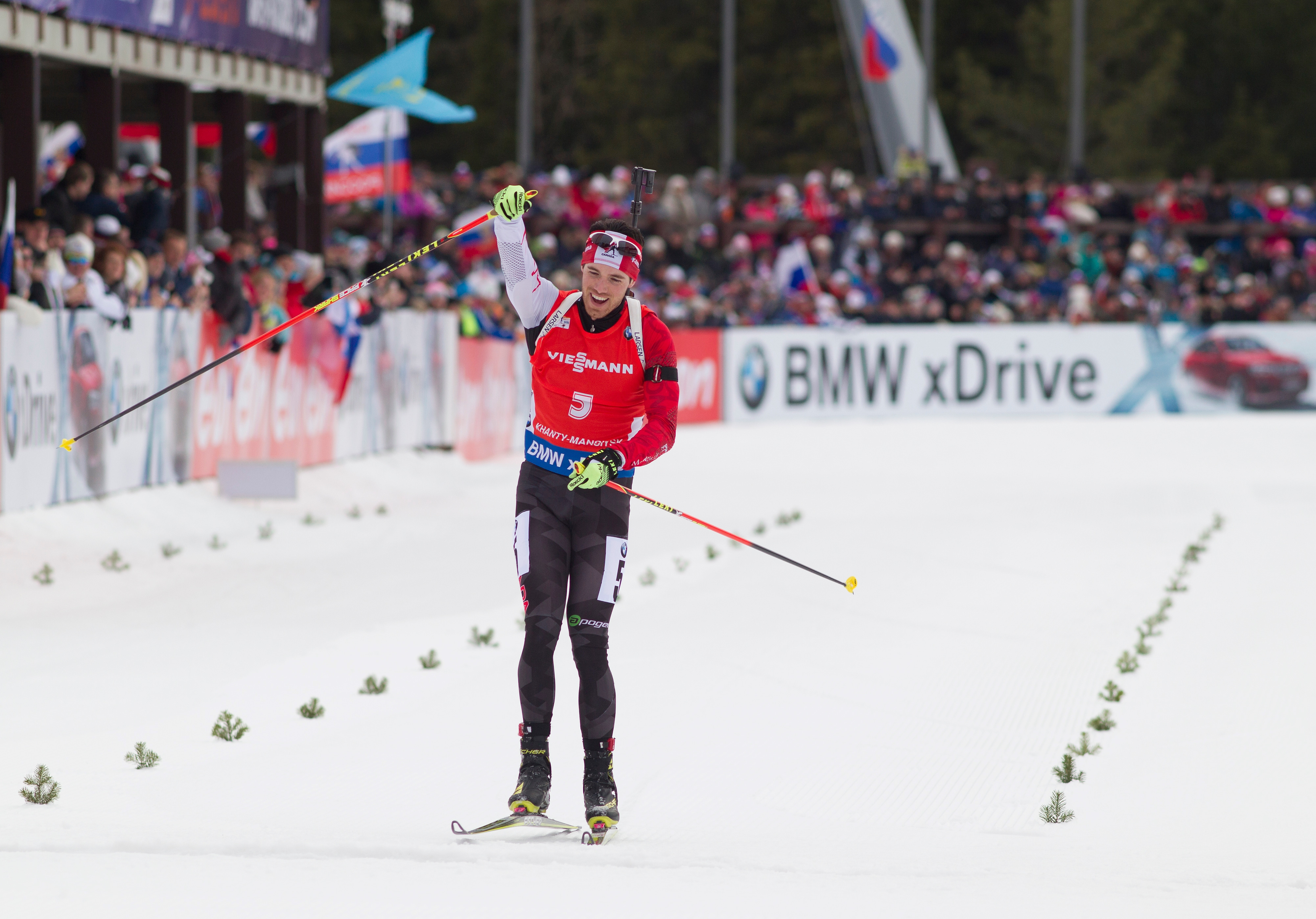
Nathan Smith has come close to winning a World Cup before. He’s just never quite done it.
The 29-year-old Canadian biathlete has been on the podium – he won a silver medal in the sprint at World Championships two weeks ago – and he’s been in podium position late in the game in pursuit and mass start races. That experience showed on Saturday in Khanty-Mansiysk, Russia, when things finally came together and Smith notched his first win, a 24-second victory over Benedikt Doll of Germany in the 12.5 k pursuit.
“I’ve felt good since taking a few easy days after Kontiolahti, and I knew that since I took an easy day yesterday I should be feeling good today,” Smith said. “I had that feeling in warmup too.”
Right from the start, Smith raced like someone who knew he belonged at the top. He cleaned target after target, and skied aggressively and confidently on the trails. At one point he pulled a group that included Martin Fourcade of France and Anton Shipulin of Russia – two of the sport’s biggest heavyweights – around for almost the entire 2.5 k loop.
“I passed Martin at one point,” Smith said. “I guess he didn’t want to lead, so he made me lead for a little while. I would have rather not, but he was sneaky about it. It was okay though– I didn’t want guys catching us from behind.”
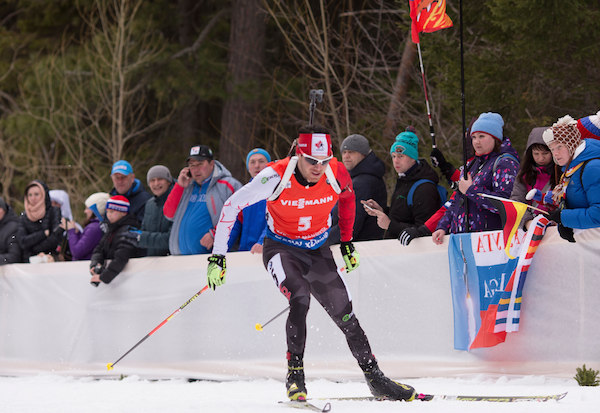
It was when Smith cleaned the third shooting bout, and the first standing one, that it began to really look like he could take home the win. When his competitors missed shots, Smith headed out onto the trails alone. And the diminutive Canadian looked very much alone as he pushed through the loop, trying not to lose time to the chasers.
When he came back onto the range, he had a 15 second advantage. He could take his time, as long as he hit all his shots; a penalty loop, which usually takes a bit over 20 seconds to complete, would put him in jeopardy of losing the lead to someone behind him, should they shoot clean.
“I felt pretty nervous,” Smith admitted. “I definitely had a little flashback when I was coming into the stadium of Östersund earlier this season when I was in third, I think, and then I totally bombed the last standing. I missed three. I was a little bit nervous about that, but I think experiences like that also help you. I could really clear my mind coming into the lane, and I did a really good job focusing on the task.”
Smith didn’t clean. He picked up his first penalty of the day, and headed to the penalty loop. The expression on the face of Canadian Head Coach Matthias Ahrens, who watched the shots from behind a scope, was ambivalent.
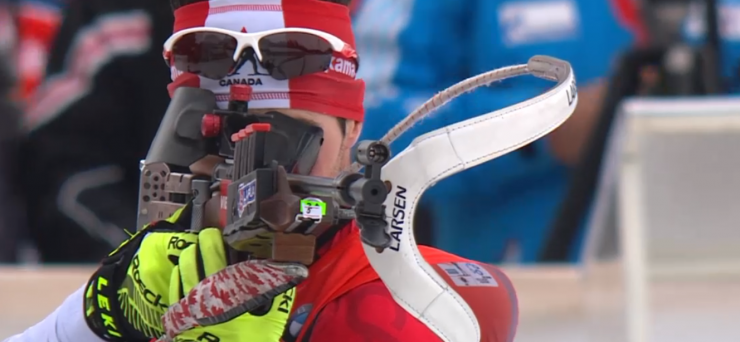
“I was still nervous,” said Smith. “I didn’t know how those other guys were going to shoot. I’ve seen Martin hit 20 out of 20 in gale force winds. He’s the best shooter on the World Cup. I think him and Shipulin were fighting for the [World Cup] overall so I think maybe that played to my advantage a little bit and threw them off their game on that final bout.”
Behind Smith, conditions on the range remained dicey – or maybe even got dicier. First Fourcade, then Shipulin, then Arnd Peiffer of Germany picked up two penalties apiece.
Doll, who came into the range in fifth place, had only one penalty, like Smith. He skied out of the penalty loop into second place, 37 seconds behind the Canadian.
“I wasn’t totally relaxed,” Smith said. “We only have one support guy here, Tom [Zidek, the head of the service team], and so I didn’t get that many splits. I just got one leaving the stadium when Tom said those guys were still in the loop. So I knew I had maybe 25 seconds. I kept going hard until the last climb and then I knew I was safe.”
It was a stunning margin for Smith, who was able to cruise around the final loop and enjoy his trip into the finishing lanes, a trip he had dreamed about for so many years.
“It was kind of surreal to be skiing by yourself on the last lap,” he marveled. “Usually your first win, you’d think it would be a nailbiter, right to the line and somehow outlunge the guy. It was kind of awesome to have a buffer where I could enjoy the final finish stretch and have that moment.”
Behind him, Doll was just as ecstatic to finish second. He was overcome with emotion as he crossed the line. Before this weekend, 24-year-old Doll had never been on the podium – he had a collection of top-10’s but as recently as last season was also competing at second-tier events like European Championships.
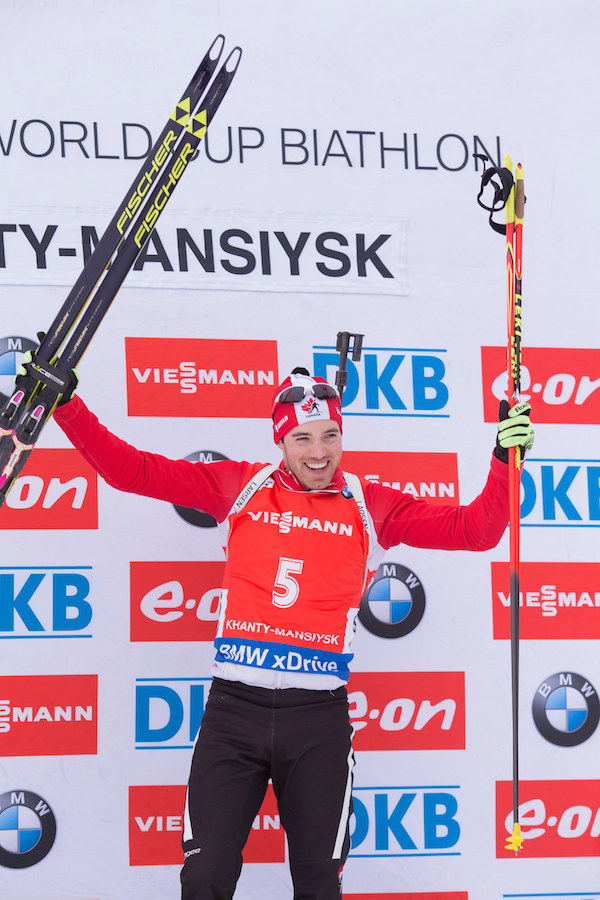
Doll now has two podiums to his name after finishing third in the sprint, and is asserting his name as one to add to his teammates Simon Schempp, Peiffer, and Erik Lesser as being among the top Germans.
“I didn’t imagine it before the race,” he said in a press conference. “I said, okay, I just want to do my job, especially at the shooting range…. Standing, I had two times one mistake. In the last stage I said, okay, one mistake. I saw Martin and Anton in the [penalty loop] and I said, one [loop], it will be fourth or fifth place. I made my round and when I came out and saw, okay, second place, I was so excited! I gave everything.”
After completing their penalty loops, Shipulin and Fourcade had hit the course together. They left Peiffer behind as they tried to one-up each other on the trail. Fourcade is often the favorite under such circumstances – his explosive sprint speed can allow him to leave competitors behind in a matter of meters, when he decides to turn it on – but today, it was all Shipulin.
The Russian extended his lead coming around the final corner into the finish, and never looked back. He gave it his all and left Fourcade in the dust.
“I knew Martin was a very strong rival, and I had a choice,” Shipulin said in the press conference. “Try to catch up with Benedikt, and maybe not catch up because he’s in very good shape now, or save the power for the final rush… I decided to keep it for fighting Fourcade. It was quite cool that Russia was on the podium.”
“In the stadium Anton was just a bit faster than me,” Fourcade said in a post-race video interview with the IBU media team. “We both know he is powerful at the finish.”
Another Two Globes for Fourcade, Plus Wax Drama
Fourcade, though, still celebrated as he crossed the line. His result, compared to the results of others, means that he’s has clinched the overall World Cup title for the fourth time in a row.
“That was my main goal this season,” he said. “I’m full of happiness because I have these trophies. But I’m also not satisfied because of the fourth place…. With the sprint and pursuit globes and the overall World Cup globe for the fourth time in a row, that is more than a dream for me. I will enjoy this, this time.”
There’s still one more race, a mass start on Sunday, and other positions are up for grabs. Shipulin has clinched second place, and Jakov Fak seems to have a good hold on third, but other positions may shift.
Fourcade made history, as no other biathlete has ever won four World Cup Total Score titles in a row. If he can win two more, he will match Norwegian great Ole Einar Bjørndalen for the number of total titles. To steal Bjørndalen’s individual race win record, though, he’ll have to stay in the sport a long time: Bjørndalen has 93 wins and Fourcade just 37; this season he won eight races, at which rate he’d have to keep racing for seven more years with the same level of success.
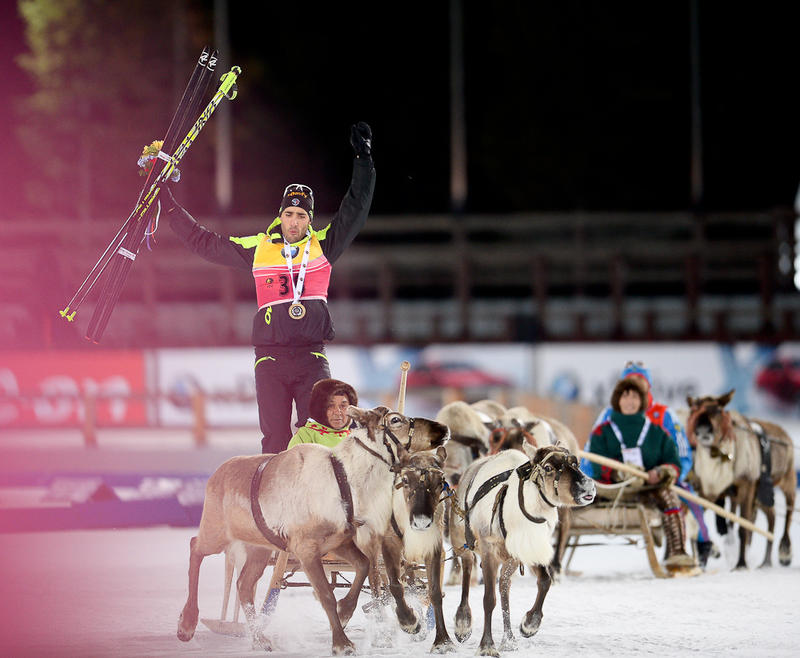
One of Fourcade’s competitors, and a previous World Cup Total Score winner, Emil Hegle Svendsen of Norway dropped out mid-race. In the Norwegian press, Svendsen blamed it on his skis.
“I knew early on that skis were not working optimally,” he told NRK. “I’ve obviously made a wrong choice.”
Indeed, Svendsen had just the 51st-fastest ski time on his first loop (he dropped out partway through the third loop). Other Norwegians didn’t have such bad skis – or at least did not complain as much. Tarjei Bø had the 19th-fastest ski time on the day and moved from 50th place up to 11th to lead the Norwegian team.
Bjørndalen, who shot perfectly in Thursday’s sprint but only finished ninth, and was then undone by poor shooting in the pursuit and slipped to 27th, said his skis were horrible in the sprint but fine today.
In fact, he used Smith’s success to argue that Norwegian expertise in ski preparation is no longer the top of the game.
“On a scale of one to 10, with 10 being the worst, [my skis] were 10 in the sprint,” he told NRK. “With the resources we have, it’s not okay that some other man has better skiing. Canada has one serviceman here [in Khanty-Mansiysk], so there must be some knowledge that they have that we don’t.”
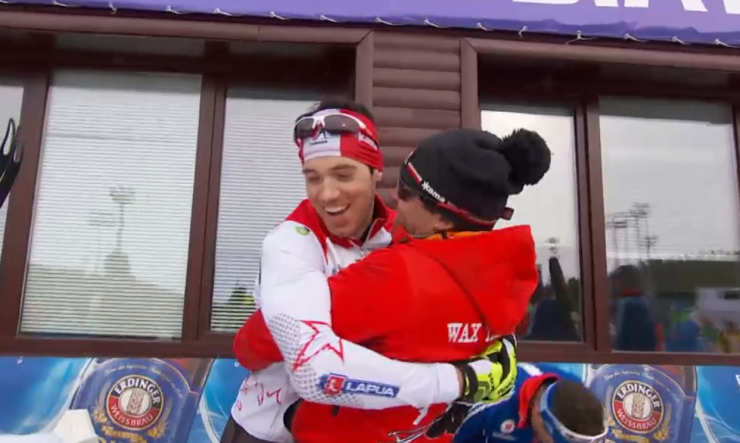
Fourcade also complained about his skis.
“My skis were not so much gliding during the competition,” he said in the post-race video. “It was really hard for me to follow the other guys.”
While emphasizing that he did, in fact, have great skis, Smith also brushed off the idea that his success came because others were slowed by their equipment.
“Whenever anyone is skiing well and they have a good result, they are going to say that their skis are good,” he said. “When they aren’t feeling well, they’re going to say, oh, my skis, they weren’t the best. But our skis are consistently among the best.”
Asked about what that special knowledge was, Canada’s head wax technician, Tom Zidek, did a metaphorical shoulder shrug (he often has other servicemen to help, but with just three athletes in Khanty-Mansiysk for budget reasons, Canada sent only Zidek and head coach Ahrens as staff).
“I don’t know how I can do it and not Norway,” he told NRK. “The secret is to work hard and use your head.”
Nordgren 19th, Bailey and Green Top-30
U.S. Biathlon’s Leif Nordgren had placed 21st in the sprint, and made his way up to tenth place after the final shooting bout. Nordgren missed three of his ten prone shots, but then cleaned every standing target to climb his way through the field.
“Today I was really disappointed to have missed 3 in prone,” he wrote in an email. “That’s not usually a problem for me and it wasn’t really that windy today like it has been in training the past few days. But I was able to turn it around in standing and save myself with 10 hits in a row. In a pursuit it really helps to hit the targets at the end of the race, if you miss in the beginning you still have a lot time to make up that deficit, so hitting in the end is a big bonus.”
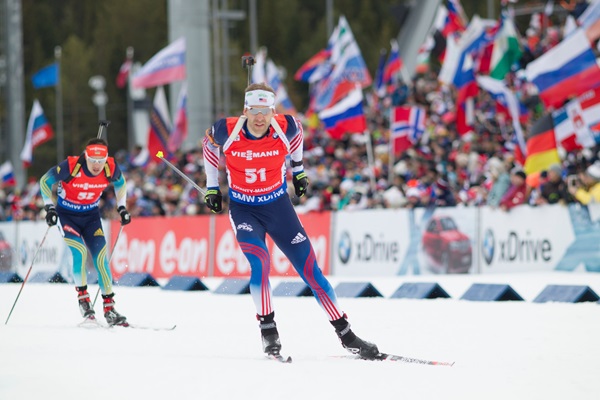
Unfortunately he was out of gas, having battled back from a head cold recently, and slipped to 17th place in the final loop. That still represented, however, his second-best result of the season, after a 16th-place finish in Nove Mesto, Czech Republic, earlier this year. It also qualified him for the 30-man mass start competition on Sunday.
“For skiing, I’m totally dead now,” Nordgren wrote. “I’ve had a little head and chest cold the last few days, so I think its maybe taking me a little longer to recover than normal, but its also getting to the end of a long season and there’ve been a lot of races recently so I’m sure that’s part of it too. Tomorrow is my first mass start of the season, first in about 4 years actually, since WCH were here in 2011. I’m really excited for it, I’m a lot better biathlete than I was back then, so I think I can have a decent results tomorrow and end the season on a really high note!”
It’s a return to form for Nordgren, who had breakthrough races and his first top-20’s at World Championships in 2011.
“Overall he showed a really high level over the last weeks and I think he would have done the same exact thing on any other venue as well, but of course it’s true that he has good memories from WCHs 2011 and really likes the course there,” USBA Chief of Sport Bernd Eisenbichler said of Nordgren’s performance. “He is good shape and would have done the same thing every where else. Overall I am very happy with his development. After a few rough years, he really made this big step forward now and it will keep going up from him from here- I am convinced about that.“
His finish put him just ahead of teammate Lowell Bailey, who moved from 51st after a frustrating sprint race all the way up to 22nd by way of shooting 19-for-20.
“Today’s race was bittersweet for me,” Bailey wrote in an email. “I was happy with my performance but it wasn’t enough to get me into the mass start tomorrow. It would have been nice to have my great performance yesterday instead of today! Anyway, it’s a good way to end the season. Now I have to shift gears and look forward.”
The final U.S. competitor, Tim Burke, finished 53rd with six penalties.
The other Canadian entrant besides Smith, Brendan Green, moved from 30th up to 23rd with just one penalty.
“Now at the end of a long season and three months away from home, I’ll take today’s result,” he wrote in an email. “Normally I would have expected more from myself on a day like today but I’m definitely running on empty and my body is ready for a break. I was happy with the performances I’ve been able to execute over the past few weeks, but at the same time I’m disappointed with the drop in my ski form and having to deal with some abrupt underlying issues with my back throughout the season, especially prior to World Championships.”
Green explained that he will have medical staff try to help re-evaluate his back problems, which stem from a slipped disc a few seasons ago and are proving difficult to permanently resolve, once he gets back to Canada.
One thing he is happy with is that 19-for-20 shooting, which has been more the rule than the exception for the second half of the season.
“My shooting since Christmas has been incredibly solid and I’m extremely happy about that,” he wrote. “I had a bit of a tough start to the season with my shooting prior to Christmas, but after re-thinking a few aspects in my approach to shooting and making a couple of changes it really seemed to come together. This is the best shooting of my career and I’m hoping I can carry it forward to next season.”
Chelsea Little
Chelsea Little is FasterSkier's Editor-At-Large. A former racer at Ford Sayre, Dartmouth College and the Craftsbury Green Racing Project, she is a PhD candidate in aquatic ecology in the @Altermatt_lab at Eawag, the Swiss Federal Institute of Aquatic Science and Technology in Zurich, Switzerland. You can follow her on twitter @ChelskiLittle.



